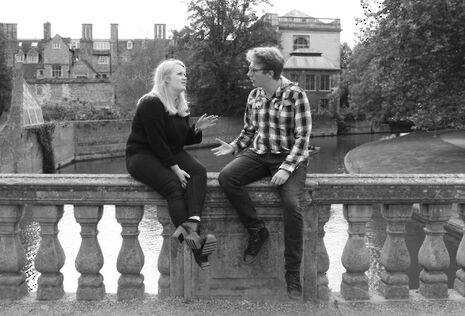Review: The Last Five Years
Thomas O’Connor was moved by the Cambridge University Musical Theatre Society’s strong performances, but highlights room for improvement in backstage elements of the show

The concept behind this week’s ADC Lateshow is wonderfully theatrical. The distillation of a five year relationship into ninety minutes, there are just two actors, it's performed solely through song and there's no set. Oh and it's told backwards. Jason Robert Brown’s “The Last Five Years” is more song-cycle than musical-theatre. It feels and sounds like a concept album in need of a playwright. While the writing of many of the individual songs is strong, the challenge lies in making the piece as a whole come alive on stage.
Fortunately Lucy Dickson and Robin Franklin, as Cathy and Jamie, have the vitality and the voices to deliver a superbly performed show. Jamie tells his story chronologically: song by song from their first meeting, to their final parting. Cathy works backwards: from her opening number discovering the note of her parted lover, to the events at the start of the relationship. Both are expertly supported by the musical direction of Harry Castle. It is a joy to hear any piece of theatre with a complete written score. Full credit must go to Toby Hession (piano), Ryden Stackhouse (bass guitar), Georgie Girdwood (guitar), Harry Castle (violin), Luke Alex Pitzer (cello 1) and Ellie Carter (cello 2). As an ensemble they blend and flow through numerous song styles with a clarity and colour that would be at home in any West End theatre.
As Jamie, Franklin is hectic and playful: full of vocal and physical joy. He bounces around celebrating his new found love, attempting to balance the conflicts of his professional and personal life. His writing career takes off just as he meets Cathy. “Moving Too Fast” is a wide-eyed exploration of his excitement, delivered with optimism and energy. His comic timing is effective in the more fun elements of the writing, and he has a keen sense for uncovering the subtlety of the lyrics.
Dickson gives us a wonderfully touching portrayal of Cathy, the vulnerable actress with an unsuccessful career. The evening opens with her heart-breakingly simple rendition of “Still Hurting”. Her honesty in these opening minutes means that despite what Jamie tells us later, our sympathy will always be with her. Going backwards in time, we see how her current state of despair evolved, as it unravels into the giddy nervousness of “Goodbye Until Tomorrow”. She sings with a truth that is rare in musical theatre: uncluttered by the dance or glitz that can falsify emotion.
The pair are somewhat strangled by the curiosities of the lighting and staging. The conceit is that they are not on stage together, each inhabiting their own point in time. Director Josh Cleary has put the non-singing character behind the action, reduced to a silent shadow projected onto the backcloth. The performer out front is then set in the dimness of a pastel wash: becoming little more than an additional silhouette. Don’t expect to make out any facial expressions: while the singers could be facially acting their hearts out, the audience will never know. The lighting cues on opening night were sloppy, and at several points the songs began in total darkness, diminishing the crispness of the performances. The set is minimal, but features the world’s nosiest chair, the placing and removing of which seems to add an entire percussion section to the band.
This being said, the closing moments reattach the timelines and the focus. With Dickson’s final heartache once more shining through the darkness, this is indeed a poignant production well worth the emotional investment.
 News / Eight Cambridge researchers awarded €17m in ERC research grants27 December 2025
News / Eight Cambridge researchers awarded €17m in ERC research grants27 December 2025 News / Clare Hall spent over £500k opposing busway 24 December 2025
News / Clare Hall spent over £500k opposing busway 24 December 2025 Comment / League tables do more harm than good26 December 2025
Comment / League tables do more harm than good26 December 2025 Comment / The ‘class’ of Cambridge24 December 2025
Comment / The ‘class’ of Cambridge24 December 2025 News / Caius mourns its tree-mendous loss23 December 2025
News / Caius mourns its tree-mendous loss23 December 2025









